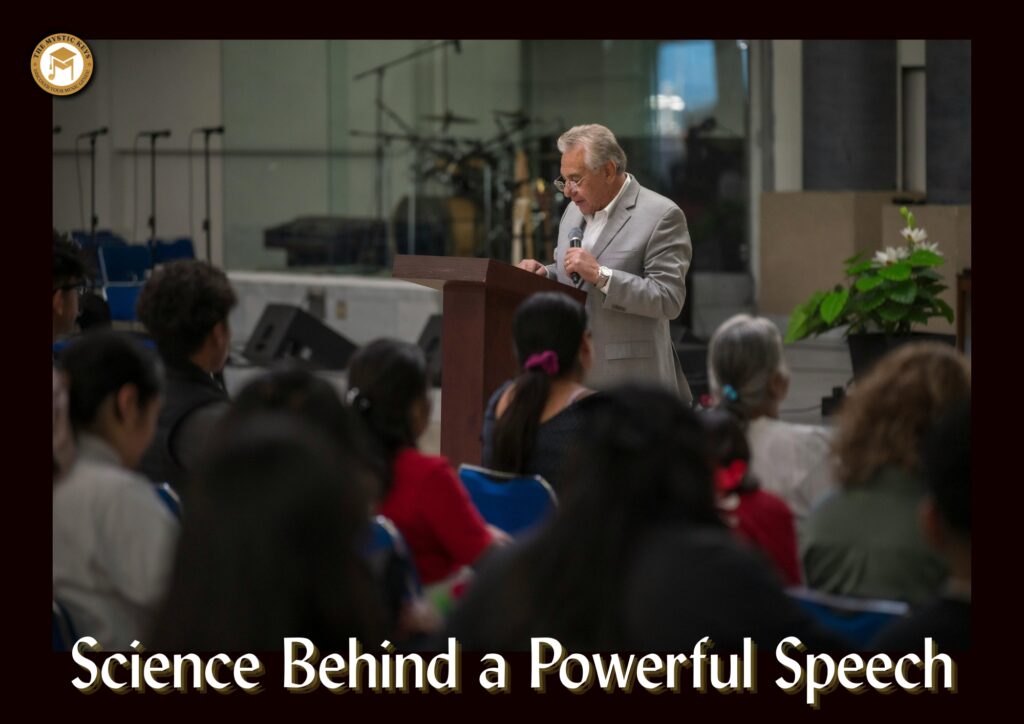Science Behind a Powerful Speech | What Makes It Memorable?
Public speaking is an art—a craft that blends creativity, emotion, and technique to leave an enduring impact on audiences. But beyond the surface of inspiring rhetoric and charismatic delivery lies the fascinating science behind a powerful speech. This science uncovers the deeper mechanisms that make certain speeches memorable—how they stir emotion, capture attention, and stay etched in the listener’s mind. Understanding these scientific principles can transform any speaker—from a nervous novice to a seasoned presenter—into a communicator who resonates deeply with their audience.
In this comprehensive blog, we’ll explore the key elements that make up the science behind a powerful speech, drawing from fields such as neuroscience, psychology, linguistics, and social dynamics. By the end, you’ll gain not only a deeper appreciation for what makes a speech unforgettable but also practical insights to elevate your own oratory skills..

The Brain on Speech | How Neuroscience Explains Memory and Emotion
The Role of the Hippocampus and Amygdala
When someone listens to a speech, their brain doesn’t passively absorb information. Instead, it actively processes, interprets, and stores it—especially when emotion is involved. The hippocampus, responsible for memory formation, works alongside the amygdala, which processes emotions.
Powerful speeches stimulate the amygdala, triggering emotional responses that signal the hippocampus to encode the experience more strongly. This is why emotionally charged stories or calls to action linger in our minds longer than dry facts or monotone delivery.
Mirror Neurons and Empathy
Humans have a network of neurons called mirror neurons that activate both when we perform an action and when we observe someone else performing it. In speech, this means that a speaker’s passion, gestures, or facial expressions can evoke similar feelings or states in the audience. This mirroring builds empathy and connection, making the speech feel personal and impactful.

The Psychology of Persuasion and Attention
The Primacy and Recency Effects
Psychological studies show that people tend to remember the first and last items in a sequence better than those in the middle. Known as the primacy and recency effects, these principles highlight why speeches often start with a hook and end with a strong, memorable conclusion.
Cognitive Load and Simplicity
The human brain has limited capacity for processing new information at one time. When a speech is too complex or overloaded with facts, listeners experience cognitive overload, reducing retention. Effective speeches balance depth with simplicity, using repetition and clear structure to reduce cognitive load and enhance understanding.
The Power of Storytelling
Stories engage multiple areas of the brain, including those responsible for sensory experiences and emotions. Psychologist Jerome Bruner stated that we are “wired for stories.” Narratives make abstract ideas concrete and memorable by linking them to characters, conflict, and resolution, which humanizes the message and helps it stick.

Linguistics | The Magic of Words and Structure
The Impact of Word Choice
Certain words activate stronger emotional or sensory responses. For instance, vivid adjectives (“thrilling,” “heartbreaking”) and active verbs (“ignite,” “transform”) paint clearer mental images. Linguistic studies reveal that metaphorical language and rhetorical devices like alliteration, repetition, and parallelism also enhance memorability.
Rhythm and Cadence
The prosody—the rhythm, stress, and intonation—of speech influences how it is received. Well-timed pauses, varied pitch, and changes in volume can create tension and release, keeping audiences engaged. Just as music relies on rhythm to stir emotions, effective speeches harness cadence to resonate deeply.
The Power of Pauses and Silence
Strategically placed pauses give listeners time to absorb key points. Silence can also emphasize significance and create anticipation, boosting the emotional impact. Research shows that speakers who effectively use pauses appear more confident and persuasive.

Social Dynamics and Speaker | Audience Connection
Establishing Credibility and Trust
To begin with, the science of social psychology emphasizes the importance of ethos—a speaker’s perceived credibility. When audiences view a speaker as knowledgeable, sincere, and well-intentioned, they are far more likely to be persuaded and to remember the message. This sense of trust forms the foundation of impactful communication, enabling the speaker to influence with authority and authenticity.
Building Connection Through Nonverbal Communication
However, credibility alone is not enough. How a message is delivered plays an equally crucial role. Research shows that over 70% of communication is nonverbal. This means that elements such as facial expressions, posture, eye contact, and gestures carry immense weight in how the message is received. For instance, sustained eye contact can convey honesty and build rapport, while confident body language reinforces the speaker’s presence and intent. These subtle signals can significantly enhance or undermine the spoken word.
Encouraging Engagement Through Audience Interaction
Transitioning from delivery to engagement, it’s essential to recognize the power of audience participation. Inviting questions, sharing relevant stories, or prompting interactive moments draws listeners into the experience. This not only keeps their attention but also activates deeper cognitive processing. Active participation fosters a sense of inclusion and co-creation, making the speech more memorable and meaningful. When audiences feel involved, they are more likely to internalize the message and form a lasting emotional connection.

Emotional Intelligence | The Heart of Memorable Speech
Recognizing and Managing Emotions
Speakers with high emotional intelligence can read the room and adjust their tone, pace, and content dynamically to maintain engagement. They also use emotional appeals—joy, hope, fear, or empathy—to align the audience’s feelings with the message.
Authenticity and Vulnerability
The science behind a powerful speech lies in its emotional authenticity. Science shows that vulnerability fosters trust and relatability. When speakers share genuine experiences or admit imperfections, listeners feel a deeper emotional connection, enhancing memorability. This is why the most impactful speeches are not just well-written—they are heartfelt. Neuroscientific research supports this, revealing that emotionally rich content activates empathy-related regions in the brain, making the message stick with the audience long after the speech ends.

Practical Tips to Harness the Science Behind a Powerful Speech
Start Strong and Finish Strong: Craft compelling opening and closing statements that evoke curiosity or emotion.
Use Stories: Integrate personal anecdotes or case studies that illustrate your key points.
Simplify Complex Ideas: Break down information into digestible chunks; use analogies and visuals.
Engage Emotion: Use vivid language, metaphors, and vocal variety to stimulate the amygdala.
Mind Your Nonverbal Cues: Maintain eye contact, use purposeful gestures, and vary your posture.
Pause for Impact: Use silence to emphasize important points and allow your audience to reflect.
Be Authentic: Share your passion and be honest about your journey or challenges.
Practice Active Listening: Observe audience reactions and adapt your delivery in real-time.

Conclusion |The Science Empowers Art
Powerful speeches are not mere happenstance or luck—they are a delicate fusion of neuroscience, psychology, linguistics, and social interaction mastered with intention and practice. By understanding the science behind what makes a speech memorable, speakers can craft messages that not only inform but move and inspire, creating lasting impressions that echo long after the last word is spoken.
Whether you’re preparing a keynote address, a business pitch, or a heartfelt toast, applying these scientific insights can elevate your communication, ensuring your speech is remembered not just for what you said, but for how you made your audience feel.
If you’re ready to unlock your full potential as a powerful speaker, consider joining The Mystic Keys’ Public Speaking Course Online. Our expert-led program combines the latest scientific principles with practical training to help you master the art of memorable speech delivery—right from the comfort of your home. Transform your confidence, captivate your audience, and leave a lasting impact every time you speak.
Join The Mystic Keys today and start your journey to powerful, unforgettable speeches!
Conclusion: Your Journey to Singing Like a Pro Starts Here
Mastering vibrato, riffs, and runs transforms your singing from basic melody delivery to expressive, professional artistry. These techniques require time, patience, and consistent practice, but they unlock your voice’s full potential.
Remember: the best professional singers combine technical mastery with heartfelt emotion. Practice regularly, stay patient with your progress, and never lose your love for singing. With dedication, your voice will shine with the richness, agility, and flair of a true pro.
Related Blogs
How can I learn public speaking? A Guide to Confidence
Public speaking is a powerful skill that can open doors to countless opportunities, both personally and professionally. Whether you’re presenting in front of a small group or addressing a large audience, the ability to speak confidently and persuasively can have a lasting impact
Public Speaking Skills for Students | Key to Confidence & Success
Public speaking is an invaluable skill that can significantly shape a student’s academic, personal, and professional journey. It empowers individuals to express themselves effectively, share ideas confidently, and make a lasting impact on their audience.
The Importance of Public Speaking | Elevating Communication Skills for Success
The importance of public speaking skills cannot be overstated, as they play a critical role in personal and professional development. Public speaking empowers individuals to articulate their thoughts clearly, influence others, and build their confidence.








